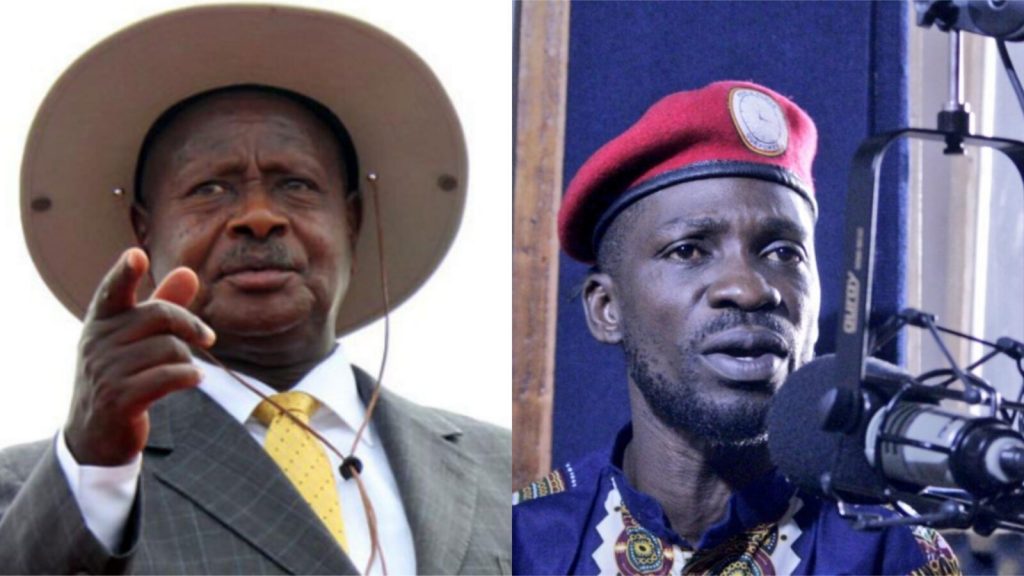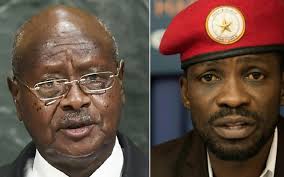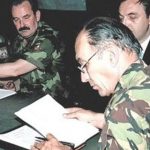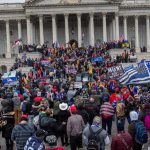Prevailing political conditions in Uganda are stacked against the likelihood of free and fair parliamentary and presidential elections later this week.
Uganda will likely see increased violence and state repression as Museveni’s ruling party seeks to maintain power. At-risk groups include political and civilian groups opposed to Museveni and his re-election, and ethnic minorities from the North and West that are excluded from power.
Ugandan elections can follow the script of Kenyan rally in 2007 when the ethnic-based electoral violence killed more than 1,000 people and displaced close to 500,000 despite assurances of victory and serenity from Mwai Kibaki.
Election in Uganda is one of the most populist in Africa and may cause severe violence in post-election period. Candidates are making lofty promises that they will not be able to keep if they win the vote. There is no policy direction or ideology in their campaign, just promises. This will increase the political instability just after voting.
Ugandans will vote for new leaders on 14 January 2021. The country goes to the polls to elect a president and members of parliament following a campaign marred by unprecedented violence with at least 60 people killed, hundreds injured and more than 800 arrested. The world waits to see whether incumbent Yoweri Museveni will see another term in office.
The two leading candidates are current President Yoweri Museveni and opposition leader Bobi Wine. Uganda has been ruled by President Yoweri Museveni of the National Resistance Movement (NRM) for 35 years since boosting a rebel group to power in 1986 after a five-year guerrilla struggle to oust Milton Obote. He is standing in his sixth election. He has won every vote since the first election under his presidency in 1996, a decade after he took power. In 2005, Uganda’s ruling-party-dominated parliament removed presidential term limits. And in 2017, lawmakers scrapped the age limit of 75 for presidential candidates in a move slammed by critics as designed to pave the way for Museveni to be president for life.
So, Museveni’s desire to hold on to the reins of power resulted in increase in the age limit at which candidates can run.
He has faced growing criticism over corruption, nepotism, a sluggish economy and the longevity of his rule. Museveni’s wife Janet is education minister, and his son Muhoozi Kainerugaba commands the military’s special forces.
The opposition thinks the government will rig the vote; the ruling party thinks the opposition is up to mischief.
The run-up to the election has seen the harassment and arrest of various opposition leaders, while on the campaign trail, including Forum for Democratic Change leader Patrick Amuriat., 57, who is running for the Forum for Democratic Change (FDC), the party formerly headed by Besigye which has the largest number of lawmakers after the NRM.
The National Unity Platform leader, Robert Kyagulanyi Ssentamu, also known as singer Bobi Wine, has been arrested several times, including in November 2020, when over 50 protesting supporters were killed by live ammunition used by security forces. Wine was last arrested on December 30, 2020.
Bobi Wine, was born in a slum in Kampala. Wine, who was three years old when Museveni come to power, studied music, dance and drama at Uganda’s oldest and most prestigious university, Makerere. His lyrics decry urban poverty and political oppression, backed by catchy, feel-good beats.

Museveni’s main challenger in 2001, 2006, 2011 and 2016 was Kizza Besigye, Museveni’s physician during the guerrilla war. He has been arrested on several occasions since deciding to run against Museveni. But Besigye is not standing this time, now he leads the People’s Government, a Kampala-based pressure group.
However, to the many challenges that the opposition faces, it has a tendency to beat itself by dividing the anti-NRM vote. So, the main question of this vote is whether the newly forged alliance between Bobi Wine and Kizza Bessigye can agree a formula to contest together in 2021, and whether they can persuade others to join their side.
The risks of violence are very high. In December, President Yoweri Museveni appointed Maj-Gen Paul Lokech, who earned the sobriquet “Lion of Mogadishu” for his exploits fighting against al Shabaab in Somalia, as the new deputy Inspector-General of Police. He replaced another army officer, Maj-Gen Sabiiti Muzeeyi. Recently, President Museveni also appointed Maj. Gen. Kayanja Muhanga to co-ordinate joint security operations involving the police, military and intelligence agencies. Gen Muhanga has previously worked in counter-terrorism operations and also commanded Ugandan troops in the Africa Union Mission to Somalia.
President Museveni said that he had deployed army units that have experience in urban warfare in Somalia because of “weakness and corruption” within the regular police force.
However, according to the opposition, Ugandan authorities are planning violence and the military deployments are an attempt to intimidate voters and opposition supporters in order to suppress voter turnout and enable vote-rigging.
Under Uganda’s constitution and the Uganda People’s Defense Forces Act, the army can be called upon to “assist the civilian authority” in an emergency. Emergencies include a riot or a disturbance of the peace which the authorities can’t bring under control. Past inquiries into joint undertakings suggest domination and intimidation of the Uganda Police by the army. The army also reportedly disregards civilian laws and procedures.
Under Uganda’s constitution the national army is subordinate to civilian authority. In practice, however, this isn’t the case. When the military is deployed during peacetime law enforcement operations, for instance, there is no statutory requirement that the army receives appropriate equipment and applies standards of training and doctrine which are in line with human rights standards fit for peacetime contexts.
President Museveni appointed the electoral commissioners and other key officials at the polls body late last year. He fired the Commission’s secretary and spokesperson. Opposition supporters say the president’s vote-rigging claims are red herrings meant to deflect attention.
The two main opposition parties, FDC and NUP, say they will operate independent tally centers to collect and verify results from their agents across the country. But Electoral Commission spokesman Paul Bukenya said political parties do not need to set up independent tally centers since they already have agents at polling stations and tally centers. However, Ugandan law does not bar political parties from having parallel tally centers.
This might be harder to execute, however, after the Chairperson of the Electoral Commission, Justice Simon Byabakama warned that cameras will not be allowed at the polling stations and that voters would also be required to leave after casting their ballots. He said this would prevent the spread of the coronavirus.
During the 2016 election, police raided the FDC tally center, confiscated declaration forms and computers, and arrested some party officials. Although the party then claimed it had suffered electoral fraud, it was unable to gather evidence to challenge the official result in court.
NUP is hoping that a new digital application allowing agents to input results from polling stations into a cloud-based server using their mobile phones will help it avoid such analogue disruptions. With both FDC and NUP asking their voters to stay at polling stations to “protect their votes”, there could be run-ins with the police – and their heavily armed military back up.
The Northern part of the country has always voted against the NRM candidates and President Museveni. This is because in the early years of the NRM government, the National Resistance Army (NRA) went on a collision path with the population in Northern Uganda resulting in the proliferation of insurgency groups. Museveni’s traditional supporters, urban Ugandans from the Baganda group, are much more likely to have access to TV, radio, and the internet. They will therefore have disproportionate weight in a “digital election.”
Indeed, since the inception of the NRM rule, the greater part of Northern Uganda has hardly had peace, with an estimated close to two million people condemned to live in Internally Displaced Peoples (IDP) camps where living conditions have been rather deplorable. This instability and insecurity in Northern Uganda have been the overriding factor for the indifference towards the NRM and therefore the tendency to vote for the opposition candidates. On the other hand, the Western and the Central parts of the country have regularly voted in favor of President Museveni largely, eager to maintain the status quo of considerable peace and prosperity.
From a sociological point of view, the NRM presidential candidate has been drawing the bulk of his support from the rural voters while the urban areas have regularly voted in favor of the Opposition.
This is why the NRM is focusing on the rural areas where it is easier to control the information that citizens receive and their access to public services. With 76% of Uganda’s population living and working in rural areas, this is a winning strategy.
The socio-economic factors have always had an influence on the choice of voting especially in the urban areas. The Opinion polls also showed that the young voters were in favor of the Opposition while the NRM received the support of the elderly population of the voters. It is believed that this demographic divide has a historical basis embedded in the post-colonial politics of Uganda. The old-aged population appears to credit the NRM for maintaining some level of stability in Uganda as opposed to the period of political and constitutional instability during much of post-independence Uganda. On the other hand, the young voters judge the NRM not in comparison with Uganda’s past but based on international standards of good governance and democratic practice. Rather than look at Uganda’s checkered past and applaud the NRM, the young generation of voters has tended to rationalize about current problems affecting them and the failure on the part of the NRM to perform to their expectation.
Uganda has one of the youngest populations in the world, with more than 75 percent of its people under the age of 30. But unemployment, especially among the youth, has been running rampant while the economy has been hit hard by the pandemic.
However, on the campaign trail, both the governing National Resistance Movement (NRM) and the opposition have promised better economic opportunities to woo young voters.
Opposition in their campaigns emphasizes the corruption of Museveni’s National Resistance Movement. Access to information during this so-called “scientific election” will be directly linked to unequal access to electricity and mobile phone subscriptions. Electricity in homes is largely restricted to homes near Kampala, which limits rural voters in accessing information via TV and the internet.
Another category of voters who have been hostage to Uganda’s past and therefore continue to vote for the NRM are the women. The history of women marginalization and oppression received concerted international attention just when the NRM came into power in Uganda.
The Museveni administration uses donor support to protect its interests. Uganda provided a buffer against “rogue state” Sudan and a channel through which to support the southern SPLA rebels. At the same time, President Yoweri Museveni has been vocal in branding presidential challenger Bobi Wine and his supporters as “foreign agents” or backed by “foreign elements”. So, the regime relying on donor aid yet accuses the opposition of being “foreign agents”.
Washington’s desire to see a better human rights record in Uganda is firmly rooted in the country’s own constitution and legal code, which prevent torture and enshrine the right to freely assemble and express viewpoints that may not be in accordance with those of President Museveni.




